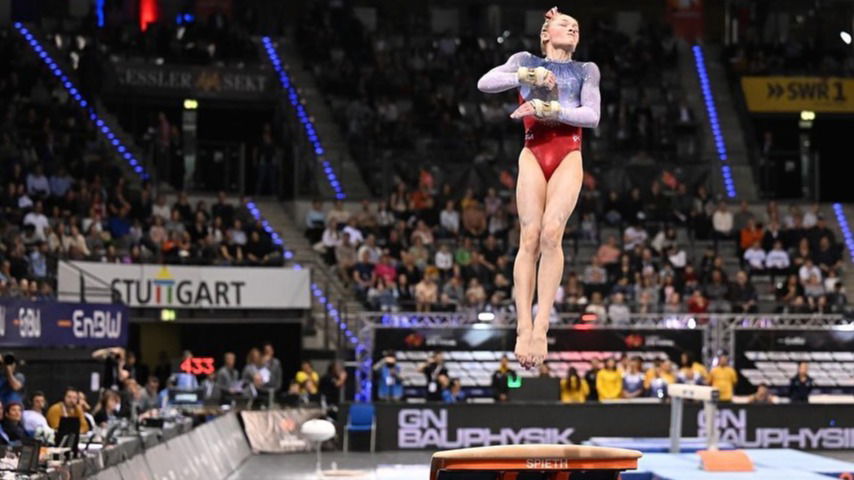
Imago
Elle Mueller

Imago
Elle Mueller
The vaults were breathtaking. The reactions were immediate. And then came the scores and with them, the uproar. At the center of the latest NCAA gymnastics controversy are two standout athletes, Oklahoma’s Elle Mueller and Missouri’s Hannah Horton. Both delivered electric routines, each bringing a different flavor to the vault table. Mueller with her signature polish and grace, Horton with a near-flawless powerhouse landing. But when Mueller’s score hit a perfect 10 and Horton’s didn’t, fans weren’t just surprised.
Watch What’s Trending Now!
Now, even retired judges are weighing in. In a sport where perfection is judged by fractions and reputation can subtly tip the scale, many are asking the same thing: Was this really a 10? Or was it a case of name bias on the biggest stage? The conversation has spilled beyond the usual fan circles, as a retired NCAA judge has stepped forward to give rare, pointed insight into what many are calling the most controversial perfect score of the season. And if you thought the fans were fired up, wait until you hear what the experts are saying.
Rhiannon Franck took to X to offer a judge’s perspective. One that doesn’t often make it into the mainstream gymnastics discourse. A retired NCAA/USAG National-rated judge, CGN Judges Inquiry contributor, nurse, and professor, Franck weighed in with clarity and nuance. “Mueller is less clean in the air, but Horton turns super early on the table. Judges get one look and no slow motion, and where judges sit can dictate what they see. One judge over-/under scoring by 0.05 on a four-judge panel is not the problem.”
Mueller is less clean in the air but Horton turns super early on the table. Judges get one look and no slow motion, and where judges sit can dictate what they see. One judge over/under scoring by 0.05 on a four judge panel is not the problem. https://t.co/omqzPFSd9E
— Rhiannon Franck (@grhiannonfranck) April 7, 2025
Her comments cut through the chaos of online outrage to remind fans that judging, especially vault, is incredibly fast and inherently flawed by visual limitations. It wasn’t about accusing the judges of bias but about understanding how things like angle and speed can blur the call in real time. That said, transparency and reform are still hot on the table. As one journalist pointed out, “None of my criticism is directed towards these amazing athletes.” And yet the frustration lingers.
Caroline Price didn’t hold back, calling for a change in a post that quickly caught fire: “One judge gave the same score to these two vaults. Reform is needed… yesterday.” That side-by-side score is what has fans buzzing. Mueller’s vault, while technically clean, lacked the explosive amplitude and landing dynamics of Horton’s. But both received near-identical numbers. And in a postseason meet with national championship stakes, the margin for error becomes even thinner and more scrutinized.
Therein lies the crux of the controversy: not that Mueller didn’t deserve praise, but that Horton might’ve deserved more. The Missouri sophomore didn’t just land a high-difficulty vault. She nailed it, posted a career-best 9.950, and helped push Mizzou past top programs like Auburn. Her execution was undeniable. And yet, the proximity in scores with Mueller’s less dynamic, though still beautiful, vault left fans and commentators questioning whether judging optics played a part.
From Nastia Cup Champion to NCAA gymnastics lightning rod
For Elle Mueller, gymnastics has always been more than a sport. It’s been a stage for artistry, resilience, and rediscovery. Long before her name lit up NCAA scoreboards, Mueller had already made her mark in the club scene, dominating competitions like the Nastia Liukin Cup. Her 2024 title win was a masterclass in poise and execution. But with her 39.175, it’s not just the winter crown that she snagged.

No, she also managed to turn the heads of critics and fans alike with an electrifying vault (9.875) and a clean bar set (9.800). It was a moment that reminded fans, elite-level brilliance doesn’t just live on the Olympic stage. It thrives in arenas like these. Her post-meet joy was infectious. In a Gymnastics Now interview, Mueller radiated pure happiness, reflecting on the hard work that led to her title.
“I’m feeling ecstatic; like, it doesn’t even feel real right now, but I’m so excited. It just pays off all the work.” Her genuine love for vaulting came through just as clearly as her finesse. “Vaulting is just such a fun event, and it’s so fast. Just to have my stick, it really meant so much. So, I’m super happy with it. It’s just like, there are many factors, you know, that went into it. But I’m finally finding my spark again.” For Mueller, it wasn’t just about winning.
It was about reconnecting with the joy that first brought her to the sport. That passion, along with praise for Oklahoma coach K.J. Kindler’s nurturing approach, has been a constant thread through Mueller’s journey. But with the highs come the headlines, and the recent perfect 10 controversy has cast a different kind of spotlight. As Mueller’s name trends for more than just her skill, fans and experts are now debating how much that “spark” is shaping scoring.
In a season where her past performances have proven her talent, the uproar surrounding her NCAA vault score and whether it truly outshone Hannah Horton’s is calling the judging system itself into question. The gymnast who once lit up the Nastia Cup floor is now at the heart of one of the season’s most talked-about scoring debates.

